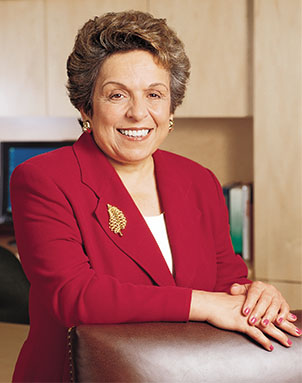
Donna Shalala, former chancellor of the University of Wisconsin-Madison.
Nurses need more training and more independence, according to Donna Shalala, former chancellor of the University of Wisconsin-Madison. Shalala was the keynote speaker at the School of Nursing’s 11th annual Littlefield Leadership Lecture in the Wisconsin Union Theater.
Shalala, president of the University of Miami, chaired the Robert Wood Johnson Foundation-Institute of Medicine Initiative on the Future of Nursing. Her report on the initiative’s findings dovetails with the UW-Madison School of Nursing’s $20 million campaign to build a new home for the School and increase faculty.
“Nurses ought not be restrained from working to the full extent of their skill and training,” Shalala told the Capital Times earlier this week. She advocates more advanced training and residencies for nurses, as well as asking that advanced practice nurses be allowed to provide more primary care services across the country.
Nurses are essential to controlling health-care costs; the key to decreasing hospital morbidity and mortality, and have proved that, with advanced training, they can manage patients across a variety of settings, Dean Katharyn May said.
An aging population, making health care available for all and a deepening nurse shortage place new demands on nursing, she said. Ten new faculty and room to house them would allow the School to increase enrollment, establish new programs and graduate an additional 50 registered nurses, 25 advanced practice nurses and 10 to 15 teachers and researchers each year.
Update: Shalala Writes Check to Nursing Campaign
Former UW-Madison Chancellor Donna Shalala believes enough in the campaign to build a new home for the School of Nursing that she wrote a personal check to support it, she told WISC-TV.
By training doctors, nurses and pharmacists together, the School will transform medicine, said Shalala, who was in Madison as keynote speaker for the 11th annual Littlefield Leadership Lecture.
The new nursing building would train nurses for tomorrow’s health needs, May said. It would include
- the largest interactive classroom complex in Wisconsin, and perhaps in the nation, to create an environment for nursing , medical and pharmacy students to learn to work in teams focusing on safety, quality and cost-effectiveness in health care.
- a simulated home health environment and a state-of-the-art clinical simulation unit,
- flexible research space to accommodate the changing needs of faculty who are internationally known for research such as improving quality in long-term care and managing symptoms of cancer and its treatment.
The School’s program must expand to provide more nurses for Wisconsin and to educate more nurse practitioners and nurse specialists who will expand access to primary care and improve care for patients with complex health conditions, May said. The School must expand to increase nurse research that will find solutions to pressing health-care problems.
